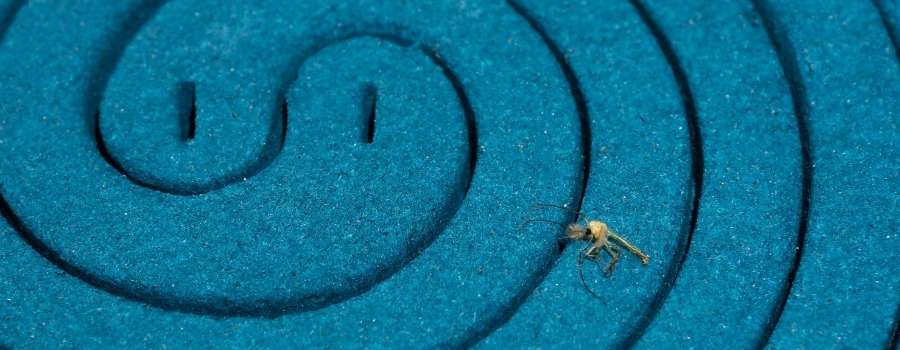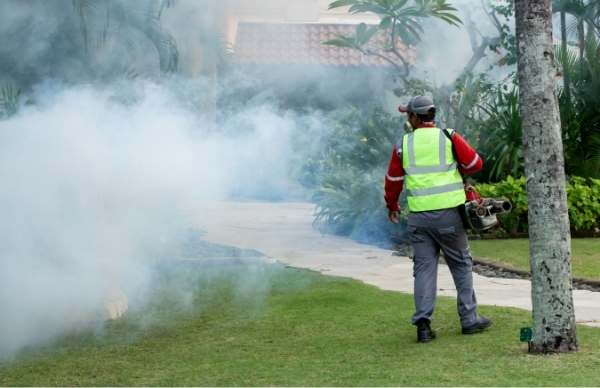
No matter where you live it seems like mosquitoes are out in full force, and you’re itching to get outside for some fresh air. The last thing that you want is to be eaten alive by these pests while trying to enjoy the sunshine!
I’ve put together this article to give you everything you need to know about mosquito foggers…including whether or not they work, how often they should be used, and if they’re safe around children and pets.
What Is A Mosquito Fogger?
A mosquito fogger is a device that emits an aerosolized mixture of insecticide and water. This mixture can be used to control mosquitoes, flies, gnats, or other pests in residential areas (including lawns).
The most common type of mosquito fogger is handheld…however, there are also backpack-style models which allow you to treat larger areas like a big yard or campsite.
The fog that is emitted from the mosquito fogger is made up of insecticides like pyrethrins, methoprene, or permethrin.
These chemicals are used to kill adult mosquitos…however, they don’t have any effect on the eggs and larvae which means you’ll need to use a mosquito fogger more than once if your goal is long-term control of these pests.
The droplets that are put out by the fogger are so small they’re almost invisible to the human eye. These droplets will kill most types of insects including spiders, ticks, and ants, but won’t cause any harm to humans or other animals (including pets).
Do Mosquito Foggers Work?
When used properly, mosquito foggers can be very effective in killing adult mosquitos. Using them in the evening, when mosquitos are least active, will maximize their extermination and can provide up to 72 hours of a mosquito-free backyard.
These devices are best suited for areas where you don’t have too many mosquitoes…like a small backyard or patio area. They’re not designed to take care of larger yards…that’s what the professionals are for…so if you have a really large area you’ll need to make multiple applications.
A mosquito fogger doesn’t work as quickly as other types of pest control like liquid sprays…however, it’s also considered safer and more environmentally friendly than these solutions because they don’t contain harsh chemicals that can harm the environment or your family.
Most insecticides used in foggers are approved by the EPA…however, they still need to be used responsibly. While they are not harmful to children and animals, you should still use caution and have kids and pets avoid the area while you’re spraying so you don’t expose them to any unnecessary risks.
You will want to spray…again, late evening is best…when it isn’t raining and when there is little to no breeze. If you’re using a handheld device, make sure that your skin and hair are covered so mosquitoes won’t be able to land on exposed areas.
Can A Mosquito Fogger Be Used Inside?
In general, a mosquito fogger can be used inside since the water-based insecticides that are emitted aren’t very dangerous for people or pets. However, they do pose a risk of accidental ingestion or inhalation so some precautions should be taken.
If you plan to use a mosquito fogger indoors, be sure that the room is well ventilated and avoid breathing it in. It’s also important to keep children and pets out of the area until the fog has settled completely.
When this happens it will quickly dissipate…however if you have children or pets that are likely to play with the fogger, you should consider using a mosquito repellent instead.
Are Mosquito Foggers Safe?
In general, as long as instructions are followed, mosquito foggers are safe to use around people and pets. The insecticides used aren’t very dangerous for humans however, it’s a good idea to take precautions and keep children and pets away from the area until everything has settled.
Safety should always be at the top of your list when it comes to spraying any kind of pesticide or insecticide in an area where your children and pets roam and play.
Luckily, mosquito foggers use insecticides that pose little to no risk. The downside to this is that foggers don’t kill the eggs and larvae that mosquitos need to survive in order to reproduce.
This means that you’ll need to spray every few weeks to make sure you eliminate each new generation. There are also some things you can do to make your yard less attractive for mosquitos like:
- Removing standing water
- Picking up pet feces regularly
- Covering any containers that might collect water in your yard (such as buckets)
- Have professionals come once a month to spray your yard for you
What Is The Best Time Of Year To Use A Mosquito Fogger?
Typically, since mosquitos are most active from late March through October, the best time to use a mosquito fogger is during this time period. Professionals recommend having them spray early in the summer season and again as Fall settles in.
It’s important to wait until mosquitos have settled in your area before you start using a mosquito fogger. If they aren’t around, the insecticide will be useless and won’t eliminate any mosquitoes.
You should also spray as early as possible to ensure that mosquitos don’t have time to breed or gather their numbers too much before you’re able to take care of them all with one fogger.
How Long Does Fogging Keep Mosquitos Away?
On average, you can expect mosquito foggers to provide 72 hours of relief in your backyard. Most foggers won’t eliminate eggs and larvae…which means you’ll need to fog more frequently if your goal is long-term mosquito control.
The best time of day to use a mosquito fogger is after sunset when mosquitoes are least active. Foggers should be placed at least 20 feet away from any areas where people are likely to spend time…and you’ll need to allow 30 minutes for the fogger to settle before going back into that area.
Fogging at this time will maximize the exposure that mosquitos will have to the insecticide and in turn, maximize your chances of eliminating them.

What Types Of Mosquito Foggers Are There?
There are three main types of mosquito foggers:
- Handheld
- Backpack
- Commercial
Handheld
Handheld units can be used for small areas such as patios. These are the least expensive option and are very easy to use…however, they can’t cover as large an area as a backpack or commercial fogger.
In spite of that, handheld models tend to be the most popular among homeowners since they are less expensive and they are lighter and easy to use.
Handheld models mainly come in three types:
- Thermal – Thermal foggers usually use propane tanks and work by heating the insecticide so that it becomes a vapor. They are usually less expensive than other types of handheld models, but they also tend to be noisy and not as powerful…and they can create rough particles in the air which is why you will want to wear goggles when using this type of equipment.
- Electric Thermal – An electric model is basically a handheld fogger that uses electricity to heat the insecticide. It works in much the same way as its propane counterpart, but it runs on batteries or can be plugged into an outlet which makes them more convenient for using inside your home…however, they are also usually more expensive than other types of models.
- Cold Foggers – Cold foggers are a newer type of model that uses a canister filled with insecticide and propellant to turn the liquid into a mist. They work much like an aerosol product, but they emit particles which makes them more effective at controlling mosquitoes over larger areas…however, cloud size is also going to depend on wind speed as well as the distance from the fogger to your target.
Backpack
Backpack units allow you to carry the unit on your back comfortably while you spray. They’re generally more powerful than handheld devices and provide faster coverage for larger areas. However, they can be a little more expensive and may not be as easy to use when you’re in tougher terrain.
Commercial
Commercial units are generally the most powerful type of fogger available…however, they tend to be the most expensive option too. They can cover very large areas quickly but require some training on how to operate them properly, so it’s usually better to eave these models to the professionals. They also need refilling more often than other types of mosquito foggers.
What Are Some Alternatives To Mosquito Foggers?
If you’re looking for an alternative to a mosquito fogger, there are several alternatives that can help repel mosquitoes:
- Citronella Candles
- Electronic Repellents
- Bug Spray/Repellent
- Bug Zapper
Citronella Candles
One option is citronella candles…these candles have been used by campers and hikers for years because they keep mosquitos away when placed around your campsite or on the patio during a cookout. They aren’t as effective indoors but can be combined with other mosquito control methods to help provide extra protection.
Similar to candles, there are also citronella burners that work in a very similar way. The only real difference is that there isn’t an open flame, just a slowly burning end…similar to incense.

Electronic Repellents
Another option for outdoor areas is installing an electronic pest repeller near your patio or deck…these devices use ultrasonic sound waves which mosquitos don’t like and will keep them away from the area.
These products are affordable and easy to install…however, they aren’t as effective as some other methods.
These also come in wearable devices that go around your wrist. The upside to these is that you don’t have to douse yourself in unpleasant-smelling bug spray or citronella…though some people, like me, actually really like the smell of citronella…but the downside is that they can be a little uncomfortable to wear since the bands can irritate the skin.
Bug Spray/Repellent
Insect repellent is a great alternative for those looking to keep mosquitos away during the day without having to leave their backyard or campsite. There are several different types of bug spray that work on different parts of the body (some only apply to the skin, while others are effective if you spray them on your clothes instead).
These products also keep ticks and other insects away since they contain DEET…however, it’s important to reapply frequently if you’re planning to be outside for an extended period of time.
Bug Zapper
There is also another type of device which can be used indoors…a mosquito zapper! These devices use electricity to kill insects and don’t put out any chemicals at all so they’re completely safe for humans and animals (including kids and pets). They’re also safe to use around food, but they can’t be used outdoors.
Mosquito zappers are more common than mosquito foggers…however, there’s one major downside which is that many types of insects will get stuck inside the device after it has been turned off! This means that you’re likely to find a lot of dead bugs all over your floor, countertops, and even on the walls.
You can buy zappers at most hardware stores or home improvement centers…however, it’s always best to check with your local municipality first before buying one as some areas ban them entirely.
Final Thoughts
While mosquito foggers can be effective at keeping mosquitos away in your backyard, they’re not the only option. But, coupled with some of the other options…bug zapper, citronella, etc…you’ll be well on your way to having a (mostly) mosquito-free backyard next summer!
